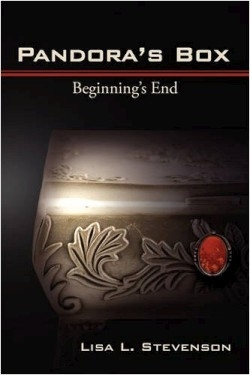Pandora's Box
Beginning's End
Pandora’s Box is like a frenetic train ride through old movies. It begins at the end of Rosemary’s Baby brushes shoulders with The Manchurian Candidate jogs past Marathon Man and turns back on itself in an unfunny Peggy Sue Got Married finale. When a young mother tries to protect her children from the clutches of the cult-like Triad she turns to FLOCK (Followers of Christ’s Kingdom) for help. Thwarted by her husband Alec’s faith in the Triad she dies mysteriously—and he apparently commits suicide. The Triad raises the boys—Eric the chosen one and Neal his big brother and official protector—to fulfill the destinies prophesied for them. The FLOCK intercedes. One boy tries to flee his fate the other embraces it—and the battle between the two groups begins again.
Lisa Stevenson’s novel is an entertaining stew that has the makings of a three-part melodrama on Lifetime TV. Her characters are deliciously evil or brave or righteous. Her title while a bit cliché defines her story. She sprinkles in some religious symbolism and a touch of CSI and voila she’s got a book that should appeal to a generation raised on the battle between good and evil in fantasy video games.
While Stevenson’s tale does not break new ground[b] [i][/b]Pandora’s Box[/i] is a good read. She never disappoints but she never surprises either. Of course Eric’s efforts to break free will fail. Of course Sharray will get pregnant. Of course Katelyn wants a baby. Of course there will be all those abducted children.
There are no Hitchcock-style suspense scenes either—no one will read this book bug-eyed with horror and scream out “Look behind you you fool.” Even so the pace is quick and the pieces fall neatly into place at the end.
Unfortunately the template-like cover of Pandora’s Box does nothing to encourage potential readers to buy the book and the uninspired graphic gives no clue to the content inside. It is clear that the author is talented—and quite a good writer. She will find repeat readers in her chosen genre. However it would be interesting to see her take on more philosophically nuanced stories that rely on broader cultural issues.
Disclosure: This article is not an endorsement, but a review. The publisher of this book provided free copies of the book and paid a small fee to have their book reviewed by a professional reviewer. Foreword Reviews and Clarion Reviews make no guarantee that the publisher will receive a positive review. Foreword Magazine, Inc. is disclosing this in accordance with the Federal Trade Commission’s 16 CFR, Part 255.

